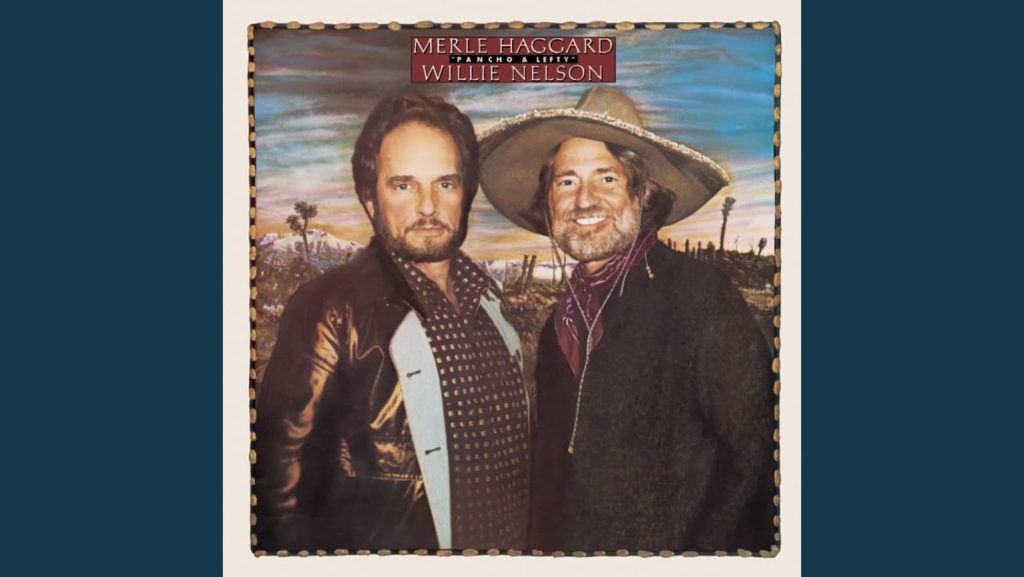
A haunting tale of friendship, betrayal, and outlaw fate in “Pancho and Lefty” by Merle Haggard & Willie Nelson
“Pancho and Lefty” stands as a deeply emotional ode to loyalty, desert wanderings, and a friendship shattered by betrayal—a song that lingers long after the last note fades, carried by the voices of Merle Haggard and Willie Nelson.
Released in January 1983 on the collaborative album Pancho & Lefty, the song became a landmark hit: the single soared to No. 1 on the U.S. Billboard Hot Country Singles chart. The album itself also reached No. 1 on the Billboard Top Country Albums chart.
The song was not originally written by Haggard or Nelson—it was penned by the enigmatic Texas songwriter Townes Van Zandt in 1972. His original, recorded on The Late Great Townes Van Zandt, carried a spare, folk-country feel and intricately woven storytelling.
According to legend, Willie Nelson’s daughter Lana played a crucial role in bringing the song to prominence. During the recording of the Pancho & Lefty album, Nelson and Haggard felt they lacked “that one big song.” Lana suggested they listen to Van Zandt’s version; Nelson responded by waking Haggard on his tour bus late at night to record their vocals.
Lyrically, “Pancho and Lefty” is a master class in storytelling. It introduces Pancho, a restless outlaw who leaves home and his mother to ride “south of the border.” He lives boldly but ultimately meets his fate. In contrast, Lefty is more ambiguous—part partner, part traitor. He betrays Pancho, reportedly for money or safety, aiding the Federales in taking him out. The heart-piercing refrain, “All the Federales say they could’ve had him any day / They only let him slip away out of kindness, I suppose,” carries both irony and regret.
Townes Van Zandt himself admitted he wasn’t entirely sure what the song meant. Over time, interpretations have ranged widely: Pancho as a symbolic figure, Lefty as a lost friend, or even a parable of compromise and guilt. In interviews, Van Zandt denied that Pancho represented the revolutionary Pancho Villa, saying: “In my song, Pancho gets hung … the real Pancho Villa was assassinated.”
Musically, the Haggard–Nelson version is understated yet deeply evocative. The arrangement features gentle guitar work, subtle harmonica, and soft backing — providing a backdrop that lets their voices carry the emotional weight. Their duet is more than a performance; it feels like two old friends narrating a shared memory filled with sorrow, longing, and unresolved guilt.
The meaning of the song is profound and multi-layered. It isn’t simply a ballad of outlaw life — it’s a meditation on loyalty, regret, betrayal, and the cost of choices. Lefty’s betrayal may have been pragmatic, but he is not painted as a villain outright; rather, he’s haunted by what he has done. The final verse suggests that while Pancho’s life was lost, Lefty is left to “grow old” under the weight of his decision.
From a broader perspective, “Pancho and Lefty” became a defining moment in country music. It introduced a wider audience to Townes Van Zandt’s songwriting genius, and it showed how two legends (Haggard and Nelson) could come together to reinterpret a haunting story. After its release, the song helped cement the outlaw-country aesthetic in the mainstream.
For listeners steeped in memories of classic country, pressing play on this song is like dusting off an old photograph — you hear the creak of boots, the rustle of sagebrush, the weight of decisions made under a scorching sky. It brings to mind long drives down rural roads, evening gatherings around a radio, or quiet moments of reflection with a worn record spinning gently.
Ultimately, “Pancho and Lefty” is a song that resonates because it is not just about outlaw legends — it is about humanity. It’s about friendship, sacrifice, and consequences. In Haggard’s and Nelson’s voices, you hear the regret, the pride, and the unspoken sorrow of men who understood that freedom often comes at a price. And perhaps, as the song suggests, it is in the telling of that story — in the sharing of that regret — that we find a kind of redemption.